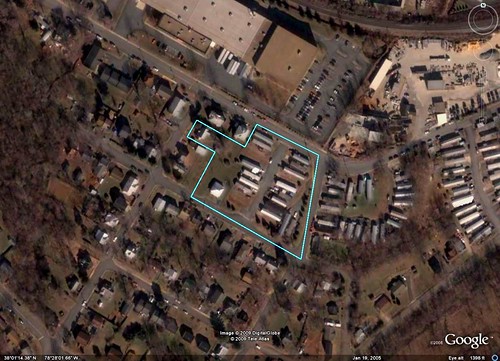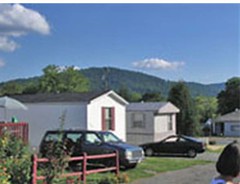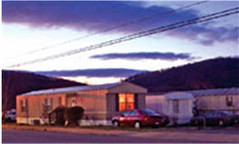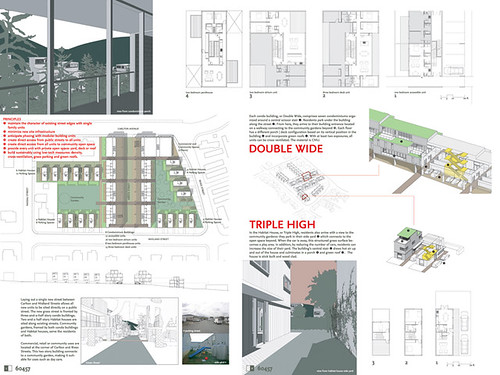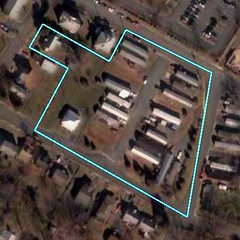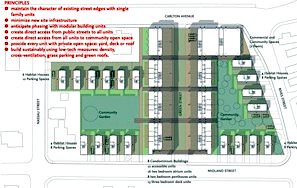Rethinking the trailer park as affordable urban housing

Posted February 16, 2009 at 2:13PM
Where I grew up, a lot of people lived in mobile homes, as a way to enter the housing market at an affordable price. Still do. And now there is some fascinating new thinking about how to make such sites more practical, livable, and sustainable - building on the mobile home model, while also fitting in more seamlessly with an urban pattern.
In particular, a few years ago Habitat for Humanity in Charlottesville, Virginia, acquired the old Sunrise Trailer Court in a mixed, somewhat industrial section of the Belmont section of town, not far from the entrance to Monticello. Since the 1970s Belmont has been the target of study and revitalization efforts by community development agencies. This is the current site:
Beginning in 2005, Habitat began to work with current Sunrise residents and the Charlottesville Community Design Center "to replace the Sunrise trailer park, located within the urban center of Charlottesville, with a dense, affordable, mixed-income housing development that is culturally and environmentally sensitive."
The Design Center, in particular, sponsored an international competition to develop a master plan for the small site of just over two acres. As described on Habitat's website for the project, entrants were asked to design a community of approximately 55 homes (including apartments and condos), half of which would be affordable for low-income families and the remainder to be market-rate housing for working families. Other criteria included the use of innovative building technologies, sustainable features from site design to energy-efficient operation, and the use of green space and other community-building features. Existing Sunrise residents and the larger Belmont neighborhood were represented on the nine-person jury that decided the winner.
First place was awarded to Susanne Schindler and Chris Genter of Cambridge, Massachusetts, for this design:
To the jurors' eyes, their design most intimately understood and incorporated the existing orientation of the site, while also addressing the residents' desire for open communal spaces where they will be able to gather, garden, and play. While the new structures will be fixed, not mobile, they build on existing mobile home concepts, using prefabricated materials and following the long, narrow proportions of mobile homes. Some units will be, in effect, "double wide," while others will be "triple high." There is ample green space, certainly more than Sunrise residents have enjoyed in the past. Compare close-ups of the beginning site with the new plan:
University of Virginia architect and professor Bill Morrish, who collaborated on the project, likes the idea of building on the mobile home concept. Here's a passage from an article on Morrish by Steve Berg of MinnPost, a web-based news site in Minnesota:
"Trailers have long interested Morrish. He likes the simplicity of long, narrow, free-standing structures. Light and breezes come in from either side. If ceilings are pushed to 10 feet or higher, small rooms can feel much larger. And since most walls are exterior walls, the possibilities of adjacent gardens and indoor/outdoor spaces are many . . .
"Schindler's winning design arranges long, narrow units in offset layers of one to three stories. All homes have access to green spaces. All use natural light and cross ventilation. The project surrounds a series of community gardens. Parking is on the first level of the condo buildings or alongside the single units. Pre-cast materials are employed to save money and comply with green-building goals."
The project hopes to have at least half its units LEED-certified and to be eligible for LEED-ND certification as well. It is now undergoing the various municipal reviews to be entitled. It has a great goals statement (one snippet: "Gather input from children by engaging them in the community process"), which just about all development would do well to emulate.
I'm tempted to say this is thinking outside the box but, in a way, it's the opposite. It's thinking with the box, very much grounded in the real world, yet highly creative. Keep it up, people.
